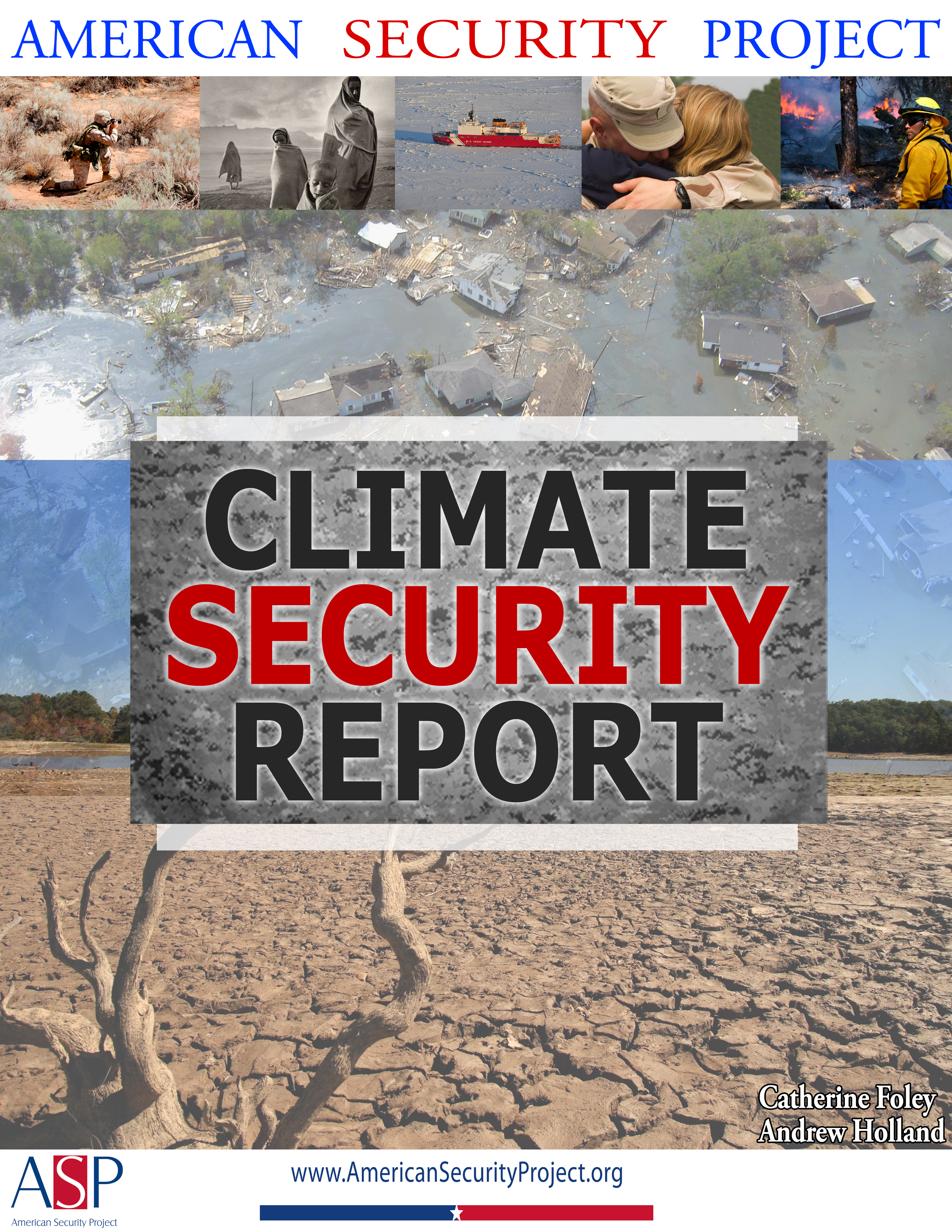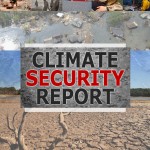
Climate Security Report
 One of the most significant challenges to the global security system in the 21st Century will be a changing climate; the effects of these changes are already being felt all over the world. Climate change poses a clear and present danger to the United States through its effects on our global allies as well as its direct effects on our agriculture, infrastructure, economy and public health.
One of the most significant challenges to the global security system in the 21st Century will be a changing climate; the effects of these changes are already being felt all over the world. Climate change poses a clear and present danger to the United States through its effects on our global allies as well as its direct effects on our agriculture, infrastructure, economy and public health.
Though this debate continues to rage, there should be no doubt that national security leaders understand that this is a question of risk management. As a national security institution, ASP knows that there is no such thing as “certainty” on the battlefield—there is only uncertainty. The same goes for preparing for climate change; the United States must be ready for contingencies.
Strategic planning for these contingencies will render the U.S. more secure, helping to ensure global stability in a warming world.
The following report aims to move past the current debate about climate change and towards a real, informed discussion about its security implications—both global and domestic. Though we do not expect that there will be legislation passed on this issue in the next few years, this report hopes to discuss the strategic security imperative of climate change to the United States and the necessity to prepare for the changes that lie ahead.
You can read the report sections in the links below or download here:
CSR – Part One: Climate Change and Security
CSR – Part Two: Climate Change and the Global Security
CSR – Part Three: Climate Change and the Homeland
Also:
American Security: The Impacts of Climate Change
Climate Change, The Arab Spring and Food Prices
Military Basing and Climate Change







[…] You can read the whole of the Climate Security Report here. […]
[…] the full report here […]
[…] See other sections of report here […]
[…] See other Sections of report here […]
[…] See other sections of report here […]
[…] around the world that are most vulnerable to climate change. To read more, check out the full “ Climate Security Report,” from which the fact sheet was […]
[…] Read the full report here. […]
[…] Read the full report here. […]
[…] Read the full report here. […]
[…] Read the full report here. […]
[…] the American Security Project released a major publication, “The Climate Security Report,” which clearly connects the dots between climate change and national security. The report was […]
[…] Climate Security Report […]
[…] think-tanks have also put out reports discussing the seriousness of the threat, including the American Security Project (which includes on its board of directors a number of former military officials in addition to John […]
[…] American Security Project released its new Climate and Security Report yesterday, authored by Senior Fellow Andrew Holland, and Adjunct Fellow Catherine […]
[…] discussion about its security implications—both global and domestic." Read the full report here. The American Security Project is a non-profit, non-partisan public policy and research […]
[…] As clean-up from Hurricane Sandy continues and the rebuilding process begins, our national response to the historic storm should be examined through the lens of governmental organization. Though many of the ground-level emergency personnel from FEMA, DoD, and state/local agencies would likely have made it to the scene in some capacity as part of a natural disaster response fifteen years ago, the coordinating mechanism has been jiggered considerably. This is a result of a targeted effort to expand our collective concept of homeland security to include personal security as discussed in American Security Project’s recently released Climate Security Report. […]
[…] American Security Project. a leading bi-partisan national security think tank, just released a new r… also emphasizing that climate change is real and happening in real time. It outlines costs of […]
[…] American Security Project. a leading bi-partisan national security think tank, just released a new r… also emphasizing that climate change is real and happening in real time. It outlines costs of […]
[…] American Security Project. a leading bi-partisan national security think tank, just released a new r… also emphasizing that climate change is real and happening in real time. It outlines costs of […]
[…] American Security Project. a leading bi-partisan national security think tank, just released a new r… also emphasizing that climate change is real and happening in real time. It outlines costs of […]
[…] American Security Project. a leading bi-partisan national security think tank, just released a new r… also emphasizing that climate change is real and happening in real time. It outlines costs of […]
[…] the Climate Security Report, a new investigate by a bipartisan American Security Project, meridian control isn’t promoted as […]
[…] today on the connection between climate change and national security, citing ASP’s new “Climate Security Report.” From the article: Today, one hurricane (or tornado or fire or drought) does not constitute […]
[…] American Security Project released a major publication last week, a three-part report called the “Climate Security Report.” You can read the report in its entirety by clicking here. To read the full article from The […]
[…] heavily quotes the American Security Project’s recently released Climate Security Report, which features a large section on the current and projected impacts of climate change on the U.S. […]
[…] American Security Project released its new Climate Security Report stating the changing climate as one of the largest challenges to global security, and the United […]
[…] the Climate Security Report, a new study by the bipartisan American Security Project, climate control isn’t promoted as a way […]
[…] read the full report, click here. Be Sociable, Share! […]
[…] of instability.” Just two weeks ago, on November 1, the American Security Project released its Climate Security Report which detailed how climate change is harming American and global security. Today’s conflict in […]
[…] warming universe presents a foreign policy challenge to a United States: it exacerbates healthy apparatus nonesuch in sensitive regions of a world, […]
[…] warming planet presents a foreign policy challenge to the United States: it exacerbates natural resource scarcity in sensitive regions of the world, […]
[…] warming planet presents a foreign policy challenge to the United States: it exacerbates natural resource scarcity in sensitive regions of the world, […]
[…] and the American Security Project, a bi-partisan national security think tank, has released their Climate Security Report addressing security concerns based on climate change. This consensus suggests that the slightest […]
[…] read the Climate Security Report, click here. Be Sociable, Share! […]
[…] should note that Senator Hagel also contributed to ASP’s Climate Security Report, saying: “America and the world face unprecedented, complex and interconnected 21st Century […]
[…] Climate Security Report, Holland, A. and Y. Wang, American Security Project. (November, 1) […]
[…] serves on the board of directors of the American Security Project, which last year put out its own report on climate change as a global security threat. Of the report, Hagel said: “America and the world face unprecedented, complex and interconnected […]
[…] step in the right direction. ASP emphatically believes that climate change and energy security are national security threats to the United […]
[…] business, and the national security community step forward to educate the American public. ASP has written about the national security aspects of climate change in the past, emphasizing ways the country can […]
[…] Climate Security Report […]
[…] 2012 Climate Security Report, November 2012 […]
[…] The American Security Project has written several reports discussing renewable energy and climate change. To read more on ASP’s view of climate security, click here. […]
[…] To read more on ASP’s take on Climate Change, click here. […]
[…] Read more about how climate change effects national security in our Climate Security Report. […]
[…] a wealth of information on our website. See our Climate Security website for more details. Our Climate Security Report is a detailed undertaking of both the national security and homeland security consequences of […]
[…] I am featured on National Journal’s Energy Experts blog, a regular feature, curated by Amy Harder, that brings many of Washington’s leading voices on energy together to discuss energy and environmental issues. In my post, I talk about how drought was an early, proximate cause of the Syrian civil war, saying: There is convincing evidence that warmer temperatures in the Western Mediterranean region, caused by global climate change, made the drought worse and drove hundreds of thousands of people off their farms and into urban centers. When revolts elsewhere in the Arab world erupted in early 2011, Syria was already a tinderbox waiting for a spark. I go on to note that the Syrian civil war may be an unfortunate signifier of what war in the 21st Century may look like. I note that the 2008 National Intelligence Assessment of the impacts of climate change predicted many of the stressors that led to the Syrian civil war. However, our military and politicians are unable to have a rational debate about climate risk assessment because of the political debate about climate change, saying: Political paralysis on climate policy in Congress and the government has poisoned any rational debate about the threats that climate change poses. So long as a large portion of our political system refuses to acknowledge the very existence of what could become an existential threat to security, we will not be able to debate rational risk-analysis. In the short-run, our military and intelligence community can do their best to prepare for and prevent the threats from climate change. In the long-run, however, Congress and the government will have to acknowledge that climate change is a threat to global stability (as we’re seeing in Syria) and hence to America’s national security, and we must address it head-on. Read the whole piece, “What Syria Can Teach Us About War in the 21st Century” on the Energy Experts Blog. You can read more about climate security in our Climate Security Report. […]
[…] Kerry’s twitter feed had information about human rights and links to updates on the climate security report. Overall, his twitter feed felt a little less informative and seemed to tell me useless […]
[…] preparedness for climate change, National Defense Magazine heavily quoted ASP’s 2012 Climate Security Report: “The military and government rely on physical infrastructure to protect our nation from […]
[…] that the United States will have to respond – both big and small. As ASP’s 2012 Climate Security Report found, “Africa is the continent most likely to suffer the worst effects of climate change due to […]
[…] instability that the United States will have to respond – both big and small. As ASP’s 2012 Climate Security Report found, “Africa is the continent most likely to suffer the worst effects of climate change due to […]
[…] For more information on Security and Climate Change, follow the links below. The Global Security Defense Index on Climate Change: Preliminary Results Climate Security Report […]
[…] Climate Security Report […]
[…] like disaster response, food security, and water availability,” was written in ASP’s “Climate Security Report,” released in 2012. To reinforcing poor economic conditions in Africa to the degradation of […]
[…] more information on climate security, please read ASP’s Climate Security Report. To learn more about a specific issue, please explore ASP’s previous publications listed […]
[…] American Security Project’s Climate Security Report […]